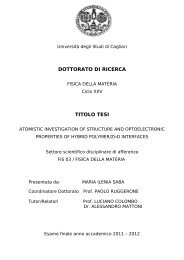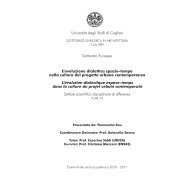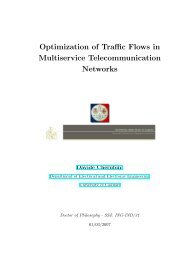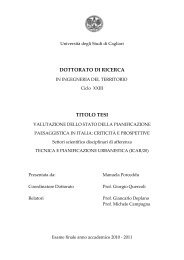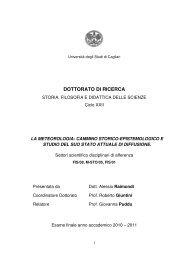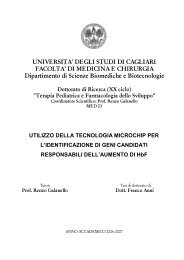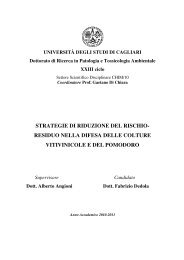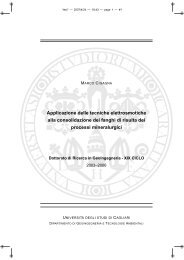The only truly alien planet is Earth. - UniCA Eprints - Università degli ...
The only truly alien planet is Earth. - UniCA Eprints - Università degli ...
The only truly alien planet is Earth. - UniCA Eprints - Università degli ...
Create successful ePaper yourself
Turn your PDF publications into a flip-book with our unique Google optimized e-Paper software.
J.G.B.: «It depends on the perspective one takes. As a therapeutic process, psychoanalys<strong>is</strong> <strong>is</strong> a<br />
complete flop, it doesn’t work. But Freud has enormous authority. He has the authority of a great<br />
imaginative writer. If you think of him as a novel<strong>is</strong>t… Thomas Szasz, the anti-psychiatr<strong>is</strong>t, refers to<br />
psychoanalys<strong>is</strong> as an ideology, and I think that <strong>is</strong> almost right. If you regard all the aspects of Freud’s view<br />
of the psyche as symbolic structures, as metaphors, then they have enormous power. I don’t think that there<br />
<strong>is</strong> such a thing as a death-w<strong>is</strong>h wired into our brains, along with all the instinctive apparatus – the need to<br />
reproduce ourselves, the need for physical freedom, the need for food, water, light – I don’t believe that there<br />
<strong>is</strong> a death instinct. It might have evolved as nature’s way of … there may be an advantage to the gene pool as<br />
a whole if there are genes that pred<strong>is</strong>pose the sick and the dying to wander off to some elephant’s graveyard<br />
to keep out of healthy people’s way. Now, that could have evolved as a death instinct, a way in which the<br />
community cleansed itself of potentially dangerous toxins. But that hasn’t happened. Nobody who <strong>is</strong> close to<br />
death wants to do anything but live. Very few people actually look forward to dying. Very few people will<br />
their own deaths. On the other hand, death has an enormous romantic appeal, there <strong>is</strong> no doubt about that.<br />
[…] Death has an enormous appeal for the romantic imagination. Obviously it stands for more than just<br />
physical d<strong>is</strong>solution of the body and the brain. It represents something else» 265 .<br />
Ancora, è una r<strong>is</strong>posta che se da un lato sment<strong>is</strong>ce chiaramente coloro i quali hanno v<strong>is</strong>to in<br />
Ballard un cupo profeta di sventura, dall’altro dimostra come ciò che un autore pensa come persona<br />
non sempre corr<strong>is</strong>ponde completamente a ciò che pensano e fanno i suoi personaggi. Per esempio, il<br />
rapporto con la morte è centrale in un romanzo come <strong>The</strong> Unlimited Dream Company, in cui il<br />
protagon<strong>is</strong>ta Blake si trova costantemente sul confine che separa la vita dalla morte. Ma soprattutto,<br />
come abbiamo v<strong>is</strong>to, altri suoi personaggi sembrano scegliere di andare volontariamente incontro<br />
alla morte, come Kerans in <strong>The</strong> Drowned World 266 . In questo caso si tratta di un riemergere alla<br />
superficie di pulsioni inconsce profonde, r<strong>is</strong>alenti a un’era primordiale dell’umanità.<br />
In conclusione notiamo come in una nota a margine di <strong>The</strong> Atrocity Exhibition Ballard si<br />
chieda se gli astronauti sognino quando si trovano in orbita, evocando indirettamente, per<br />
assonanza, l’ormai celebre interrogativo dickiano: Do Androids Dream of Electric Sheep? La<br />
r<strong>is</strong>posta ufficiale sarebbe no, ma è fin troppo facile immaginare che la r<strong>is</strong>posta ufficiosa,<br />
complementare, quella vera, sia sì 267 .<br />
265 Will Self, Junk Mail, London, Bloomsbury Press, 1996, pp. 369-370.<br />
266 «Freud concludes in the utmost pessim<strong>is</strong>tic manner that all life <strong>is</strong> a m<strong>is</strong>take […] “If we may assume as an experience<br />
admitting no exception that everything living dies from causes within itself and returns to the inorganic, we can <strong>only</strong><br />
say the goal of all life <strong>is</strong> death, and casting back, the inanimate was there before the animate. […] [T]he first instinct<br />
was present, that to return to lifelessness” [Beyond the Pleasure Principle, 1920, pp. 70-71]. <strong>The</strong> idea that within the<br />
psychic apparatus striving for pleasure there ex<strong>is</strong>ts a tendency towards self-annihilation renders the search for one’s true<br />
self suicidal. In their descent into their inner space Ballardian characters often choose death or mutilation. For the<br />
outsider th<strong>is</strong> <strong>is</strong> auto-destruction, but for said characters it means finding peace of mind and fulfilling innermost desires.»<br />
D. Oramus, op. cit., p. 54.<br />
267 «Over the years NASA spokesmen have even denied that the astronauts dream at all during their space flights. But it<br />
<strong>is</strong> clear from the subsequently troubled careers of many of the astronauts (Armstrong […] refuses to d<strong>is</strong>cuss the moonlanding)<br />
that they suffered severe psychological damage. What did they dream about, how were their imaginations<br />
affected, their emotions and need for privacy, their perception of time and death? <strong>The</strong> Space Age lasted barely 25 years,<br />
from Gagarin’s first flight in 1961 to the first Apollo splashdown not [corsivo dell’autore] shown live on TV in 1975, a<br />
consequence of the public’s loss of interest – the brute-force ball<strong>is</strong>tic technology <strong>is</strong> basically 19 th century, as people<br />
real<strong>is</strong>e, while advanced late 20 th century technologies are inv<strong>is</strong>ible and electronic: computers, microwave data links,<br />
faxes and VDTs are the stuff of which our dreams are made” [Può essere interessante notare come quest’espressione dal<br />
sapore shakespeariano venga adoperata nel romanzo <strong>The</strong> Maltese Falcon (1941) di Dashiell Hammett, pronunciata dal<br />
personaggio di Sam Spade che trionfò al cinema nell’interpretazione di Humphrey Bogart, come parafrasi delle parole<br />
- 82 -



